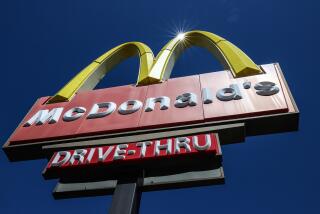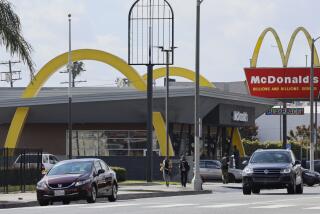Impact of fast-food minimum wage boost: Experts face off
A $15-an-hour minimum wage: Is it economic justice for the low-income backbone of American commerce? Or more like a threat to the stability of the hard-pressed fast-food industry?
The contentious issue is at the heart of protests happening nationwide outside McDonald’s, Wendy’s and other quick-service eateries Thursday as picketers in about 50 cities call for higher pay and the right to organize.
Tsedeye Gebreselassie, an attorney with the National Employment Law Project, said that for the last decade, worker wages in low-paying industries such as fast food have stagnated or declined while productivity levels increase.
“Workers are working harder than ever for less pay, but CEO pay is going up and the corporations they’re working for are enjoying very healthy profits,” she said. “And the gap is only getting wider.”
Most of the wage protests have occurred in cities, which are expensive places to live, some analysts point out.
The metropolitan areas with the most quick-service restaurants are New York, home to 25,247 eateries, followed by Los Angeles, which has 19,980 locations, according to the NPD Group.
The research group places Chicago third, with 10,776 units. Picketers are expected to target restaurants in all three cities Thursday.
The Los Angeles area has about 181,595 fast-food workers, earning a median hourly wage of $9, according to protest organizers from SEIU. They say – pointing to an MIT living wage calculator – that an adult living in the area with one child needs to earn $23.53 an hour full time to afford basic necessities.
Quiz: How well do you know fast food?
But industry groups such as the International Franchise Assn. said protesters’ goals are “unrealistic.”
Individual franchisees, not the bigwigs at corporate headquarters, determine wage levels for workers, according to the group. And many such operators are contending with thin margins made worse by a lagging economy, high commodity costs and soaring energy costs, according to the group.
Restaurateurs are also trying to adjust to the costs of future healthcare regulations, the group said.
“Mandating increased wages would lead to higher prices for consumers, lower foot traffic and sales for franchise owners, and ultimately, lost jobs and opportunities for employees to become managers or franchise owners,” Steve Caldeira, the association’s chief executive, said in a statement.
The organization also pointed to research from the National Restaurant Assn., which found that when the minimum wage was last increased in 2007, nearly 60% of eateries raised prices, more than 4 in 10 reduced employee hours and more than a quarter postponed plans to hire new employees.
But Christopher Erickson, a professor at the UCLA Anderson School of Management, said the link between wage fluctuations and menu prices “is complicated.”
“It’s more that fast-food companies are competing against each other to draw customers,” he said. “There’s been a price war recently.”
He also said that if the entire quick-service industry boosts pay for workers, then “wages are taken out of competition” because no single restaurant would have a labor cost advantage or disadvantage.
“These efforts provide a voice for those with lower-paying jobs,” Erickson said. “Particularly for those workers, higher wages could be good for pretty much everybody.”
ALSO:
Fast-food industry: healthy or just hanging on?
McDonald’s to roll out chicken Mighty Wings nationally
Chipotle, Panera, fast-casual chains continue restaurant reign







